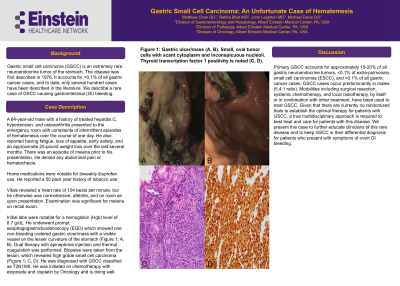Monday Poster Session
Category: Stomach
P2773 - Gastric Small Cell Carcinoma: An Unfortunate Case of Hematemesis
Monday, October 23, 2023
10:30 AM - 4:15 PM PT
Location: Exhibit Hall

Has Audio

Matthew Chan, DO
Albert Einstein Medical Center
Philadelphia, PA
Presenting Author(s)
Award: Presidential Poster Award
Matthew Chan, DO, Rekha Bhat, MD, John Leighton, MD, Michael Davis, DO
Albert Einstein Medical Center, Philadelphia, PA
Introduction: Gastric small cell carcinoma (GSCC) is an extremely rare neuroendocrine tumor of the stomach. The disease was first described in 1976. It accounts for < 0.1% of all gastric cancer cases, and to date, only several hundred cases have been described in the literature. We describe a rare case of GSCC causing gastrointestinal (GI) bleeding.
Case Description/Methods: A 64-year-old male with a history of treated hepatitis C, hypertension, and osteoarthritis presented to the emergency room with complaints of intermittent episodes of hematemesis over the course of one day. He also reported having fatigue, loss of appetite, early satiety, and an approximate 25-pound weight loss over the last several months. There was an episode of melena prior to his presentation. He denied any abdominal pain or hematochezia.
Home medications were notable for biweekly ibuprofen use. He reported a 50 pack year history of tobacco use.
Vitals revealed a heart rate of 104 beats per minute, but he otherwise was normotensive, afebrile, and on room air upon presentation. Examination was significant for melena on rectal exam.
Initial labs were notable for a hemoglobin (Hgb) level of 8.7 g/dL. He underwent prompt esophagogastroduodenoscopy (EGD) which showed one non-bleeding cratered gastric ulcer/mass with a visible vessel on the lesser curvature of the stomach (Figure 1; A, B). Dual therapy with epinephrine injection and thermal coagulation was performed. Biopsies were taken from the lesion, which revealed high grade small cell carcinoma (Figure 1; C, D). He was diagnosed with GSCC classified as T2N1M0. He was initiated on chemotherapy with etoposide and cisplatin by Oncology and is doing well.
Discussion: Primary GSCC accounts for approximately 15-20% of all gastric neuroendocrine tumors, < 0.1% of extra-pulmonary small cell carcinomas (ESCC), and < 0.1% of all gastric cancer cases. GSCC cases occur predominantly in males (5.4:1 ratio). Modalities including surgical resection, systemic chemotherapy, and local radiotherapy, by itself or in combination with other treatment, have been used to treat GSCC. Given that there are currently no randomized trials to establish the optimal therapy for patients with GSCC, a true multidisciplinary approach is required to best treat and care for patients with this disease. We present this case to further educate clinicians of this rare disease and to keep GSCC in their differential diagnosis for patients who present with symptoms of overt GI bleeding.

Disclosures:
Matthew Chan, DO, Rekha Bhat, MD, John Leighton, MD, Michael Davis, DO. P2773 - Gastric Small Cell Carcinoma: An Unfortunate Case of Hematemesis, ACG 2023 Annual Scientific Meeting Abstracts. Vancouver, BC, Canada: American College of Gastroenterology.
Matthew Chan, DO, Rekha Bhat, MD, John Leighton, MD, Michael Davis, DO
Albert Einstein Medical Center, Philadelphia, PA
Introduction: Gastric small cell carcinoma (GSCC) is an extremely rare neuroendocrine tumor of the stomach. The disease was first described in 1976. It accounts for < 0.1% of all gastric cancer cases, and to date, only several hundred cases have been described in the literature. We describe a rare case of GSCC causing gastrointestinal (GI) bleeding.
Case Description/Methods: A 64-year-old male with a history of treated hepatitis C, hypertension, and osteoarthritis presented to the emergency room with complaints of intermittent episodes of hematemesis over the course of one day. He also reported having fatigue, loss of appetite, early satiety, and an approximate 25-pound weight loss over the last several months. There was an episode of melena prior to his presentation. He denied any abdominal pain or hematochezia.
Home medications were notable for biweekly ibuprofen use. He reported a 50 pack year history of tobacco use.
Vitals revealed a heart rate of 104 beats per minute, but he otherwise was normotensive, afebrile, and on room air upon presentation. Examination was significant for melena on rectal exam.
Initial labs were notable for a hemoglobin (Hgb) level of 8.7 g/dL. He underwent prompt esophagogastroduodenoscopy (EGD) which showed one non-bleeding cratered gastric ulcer/mass with a visible vessel on the lesser curvature of the stomach (Figure 1; A, B). Dual therapy with epinephrine injection and thermal coagulation was performed. Biopsies were taken from the lesion, which revealed high grade small cell carcinoma (Figure 1; C, D). He was diagnosed with GSCC classified as T2N1M0. He was initiated on chemotherapy with etoposide and cisplatin by Oncology and is doing well.
Discussion: Primary GSCC accounts for approximately 15-20% of all gastric neuroendocrine tumors, < 0.1% of extra-pulmonary small cell carcinomas (ESCC), and < 0.1% of all gastric cancer cases. GSCC cases occur predominantly in males (5.4:1 ratio). Modalities including surgical resection, systemic chemotherapy, and local radiotherapy, by itself or in combination with other treatment, have been used to treat GSCC. Given that there are currently no randomized trials to establish the optimal therapy for patients with GSCC, a true multidisciplinary approach is required to best treat and care for patients with this disease. We present this case to further educate clinicians of this rare disease and to keep GSCC in their differential diagnosis for patients who present with symptoms of overt GI bleeding.

Figure: Figure 1: Gastric ulcer/mass (A, B). Small, oval tumor cells with scant cytoplasm and inconspicuous nucleoli. Thyroid transcription factor 1 positivity is noted (C, D).
Disclosures:
Matthew Chan indicated no relevant financial relationships.
Rekha Bhat indicated no relevant financial relationships.
John Leighton indicated no relevant financial relationships.
Michael Davis indicated no relevant financial relationships.
Matthew Chan, DO, Rekha Bhat, MD, John Leighton, MD, Michael Davis, DO. P2773 - Gastric Small Cell Carcinoma: An Unfortunate Case of Hematemesis, ACG 2023 Annual Scientific Meeting Abstracts. Vancouver, BC, Canada: American College of Gastroenterology.

